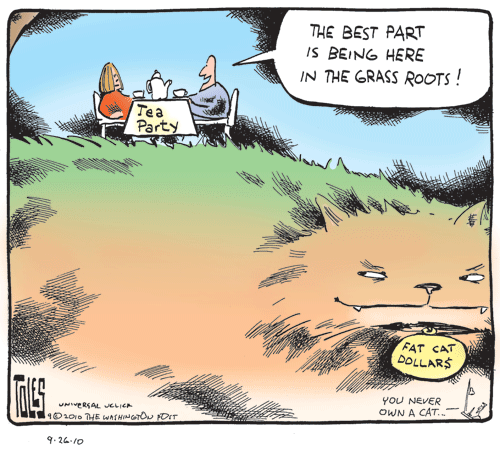This is your morning Open Thread. Pour your favorite beverage and review the past and comment on the future.
October 5 is the 278th day of the year (279th in leap years) in the Gregorian calendar. There are 87 days remaining until the end of the year.

On this day in 1877, Chief Joseph of the Nez Perce Indians surrenders to U.S. General Nelson A. Miles in the Bear Paw mountains of Montana, declaring,
“Hear me, my chiefs: My heart is sick and sad. From where the sun now stands, I will fight no more forever.”
Chief Joseph (March 3, 1840 – September 21, 1904) was the chief of the Wal-lam-wat-kain (Wallowa) band of Nez Perce during General Oliver O. Howard‘s attempt to forcibly remove his band and the other “non-treaty” Nez Perce to a reservation in Idaho. For his principled resistance to the removal, he became renowned as a humanitarian and peacemaker.
Joseph the Younger succeeded his father as chief in 1871. Before his death, the latter counseled his son:
“My son, my body is returning to my mother earth, and my spirit is going very soon to see the Great Spirit Chief. When I am gone, think of your country. You are the chief of these people. They look to you to guide them. Always remember that your father never sold his country. You must stop your ears whenever you are asked to sign a treaty selling your home. A few years more and white men will be all around you. They have their eyes on this land. My son, never forget my dying words. This country holds your father’s body. Never sell the bones of your father and your mother.”
Chief Joseph commented “I clasped my father’s hand and promised to do as he asked. A man who would not defend his father’s grave is worse than a wild animal.”
The non-treaty Nez Perce suffered many injustices at the hands of settlers and prospectors, but out of fear of reprisal from the militarily superior Americans, Joseph never allowed any violence against them, instead making many concessions to them in hopes of securing peace.
In 1873, Chief Joseph negotiated with the federal government to ensure his people could stay on their land in the Wallowa Valley. But in 1877, the government reversed its policy, and Army General Oliver Howard threatened to attack if the Wallowa band did not relocate to the Idaho Reservation with the other Nez Perce. Chief Joseph reluctantly agreed.
Before the outbreak of hostilities, General Howard held a council to try to convince Joseph and his people to relocate. Joseph finished his address to the General, which focused on human equality, by expressing his “[disbelief that] the Great Spirit Chief gave one kind of men the right to tell another kind of men what they must do.”
Howard reacted angrily, interpreting the statement as a challenge to his authority. When Chief Too-hul-hul-sote protested, he was jailed for five days.
The day following the council, Joseph, White Bird, and Chief Looking Glass all accompanied General Howard to look at different areas. Howard offered them a plot of land that was inhabited by Whites and Indians, promising to clear them out. Joseph and his chieftains refused, adhering to their tribal tradition of not taking what did not belong to them.
Unable to find any suitable uninhabited land on the reservation, Howard informed Joseph that his people had thirty days to collect their livestock and move to the reservation. Joseph pleaded for more time, but Howard told him that he would consider their presence in the Wallowa Valley beyond the thirty-day mark an act of war.
Returning home, Joseph called a council among his people. At the council, he spoke on behalf of peace, preferring to abandon his father’s grave over war. Too-hul-hul-sote, insulted by his incarceration, advocated war.
The Wallowa band began making preparations for the long journey, meeting first with other bands at Rocky Canyon. At this council too, many leaders urged war, while Joseph argued in favor of peace.
While the council was underway, a young man whose father had been killed rode up and announced that he and several other young men had already killed four white men, an act sure to initiate war.
Still hoping to avoid further bloodshed, Joseph and other Nez Perce chiefs began leading his people north toward Canada.
With 2,000 U.S. soldiers in pursuit, Joseph and other Nez Perce chiefs led 800 Nez Perce toward their friends the Crows, but when the Crows betrayed them and joined the United States army for money, the Nez Perce went towards freedom at the Canadian border. For over three months, the Nez Perce outmaneuvered and battled their pursuers traveling 1,600 miles (2,570 km) across Oregon, Washington, Idaho, Wyoming, and Montana. General Howard, leading the opposing cavalry, was impressed with the skill with which the Nez Perce fought, using advance and rear guards, skirmish lines, and field fortifications. Finally, after a devastating five-day battle during freezing weather conditions with no food or blankets, Chief Joseph formally surrendered to General Nelson Appleton Miles on October 5, 1877 in the Bear Paw Mountains of the Montana Territory, less than 40 miles (60 km) south of Canada in a place close to the present-day Chinook in Blaine County. The battle is remembered in popular history by the words attributed to Chief Joseph at the formal surrender:
“Tell General Howard I know his heart. What he told me before, I have it in my heart. I am tired of fighting. Our chiefs are killed; Looking Glass is dead, Too-hul-hul-sote is dead. The old men are all dead. It is the young men who say yes or no. He who led on the young men is dead. It is cold, and we have no blankets; the little children are freezing to death. My people, some of them, have run away to the hills, and have no blankets, no food. No one knows where they are-perhaps freezing to death. I want to have time to look for my children, and see how many of them I can find. Maybe I shall find them among the dead. Hear me, my chiefs! I am tired; my heart is sick and sad. From where the sun now stands, I will fight no more forever.”




Recent Comments